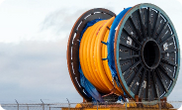A Complete Guide To Navy Shipboard Cables

Navy shipboard cables are marine cables manufactured according to military specs that apply to the navy. These cables are used on all types of military vessels and submarines. Read this blog to learn about military standards that apply to navy cables, types of navy cables, their applications, and characteristics.
Requirements For Shipboard Cables Approved For Navy Applications
There are plenty of very different navy vessel cables on the market, but they all share essential characteristics.
- The operating temperature of marine shipboard cables used for the navy is at least 90 degrees C.
- Though not necessarily low-smoke zero halogens, most cables are at least low-smoke. This is a requirement that lowers the danger of a potential fire.
- Cables are resistant to chemicals, oils, and the risks associated with cold temperatures.
- They are also resistant to the impact of sludge and mud.
MIL-DTL-24643 vs. MIL-DTL-24640: Looking Into Common Military Standards For Navy Cables
MIL-DTL-24643 and MIL-DTL-24640 are the market's two most common navy cable standards. They apply to the majority of shipboard cables that are approved for navy purposes.
MIL-DTL-24643 is a variation of military spec with a low-smoke zero-halogen jacket. LSZH jacket is flame-retardant and emits no harmful gasses when exposed to fire. MIL-DTL-24643 is a spec to go for in the environments of naval warships that are at risk of fire and are exposed to harmful chemicals.
MIL-DTL-24640 has lower smoke properties than other cables, but it is not a low-smoke zero-halogen cable. The cables have cross-linked polyolefin insulation that is considered one of the best types of insulation for marine cables, resistant to the impact of most challenging factors.
However, the primary feature of MIL-DTL-24640 is that it is lightweight. Therefore, it is used in navy applications where weight is considered a defining factor.
All in all, MIL-DTL-24643 is a low-smoke zero halogen cable, while MIL-DTL-24640 is lightweight.
Watertight vs. Non-Watertight Marine Cables
Watertight cables are meant for submersion in water either for a long time or permanently. They ate either entirely water-resistant (waterproof) or have shielding that significantly protects them from being impacted by flooding. Moreover, being watertight means that the water cannot penetrate the cable even if it is damaged. The wires usually have barriers that stop moisture from spreading deep inside the cable. Watertightness is often achieved either by using particular types of sheathing and aluminum and/or polyester tapes or by using chemicals that prevent moisture from spreading. Naturally, jackets and insulations of these cables are often water-resistant as well.
Non-Watertight cables do not have any of the properties listed above. However, these are still marine shipboard cables, so they possess a good level of water resistance, as well as resistance to the impact of saltwater.
They are used for miscellaneous applications that are not related to constant submersion in water. While it is true that many military applications call for watertight cables exclusively, non-watertight cables are still widely used.
Watertight With Circuit Integrity in the context of navy vessel cables means that the cable is resistant to fire with water, and the electrical integrity of the circuit is maintained for at least 15 minutes in the event of a fire, which allows containing fire safely.
Flexing vs. Non-Flexing Marine Cables
Flexing cables are designed for applications where the cable is expected to move very often or even all the time. A cable without these properties will likely break if subjected to frequent movement. These types of applications are common in the navy. Most often, these are communication cables and cables used in electronic devices. Flexing cables are made of highly durable materials.
Non-flexing cables cannot be subjected to constant movement. That does not mean that these cables cannot be flexible, as flexible and flexing wires are different. The term "flexible" simply means that the cable can be bent.
Where To Buy?
Common Mil-24640 cables are TTXOW, MXCOW, FXWA, DXWA, and others. All of them are sold by Nassau National Cable at excellent prices.
Popular MIL-24643 cables are LSAU, LSCS, LS2OW, LSSF, and others. Nassau National Cable offers a wide range to choose from.

















